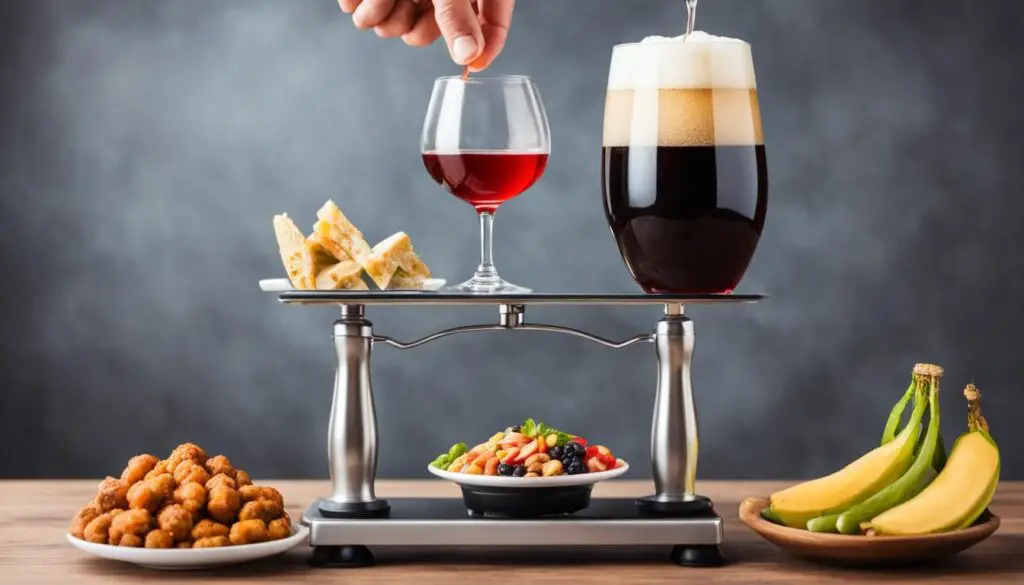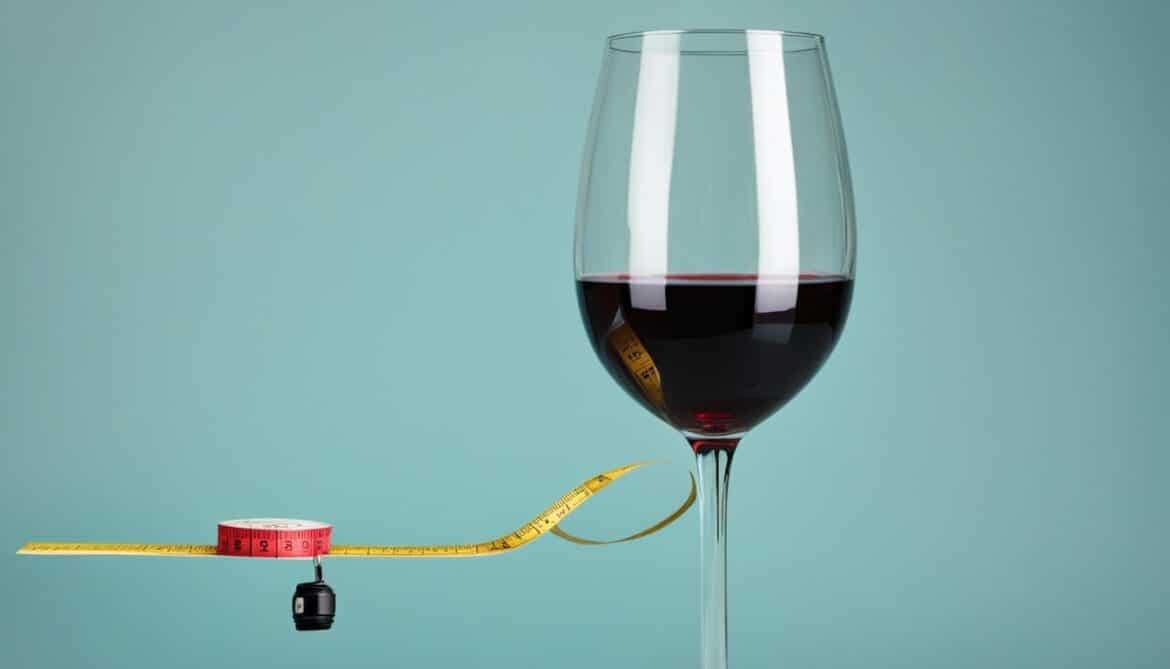When it comes to achieving weight loss goals, finding a balance is key. This includes not only maintaining a healthy diet and engaging in regular physical activity but also being mindful of alcohol consumption. While enjoying a drink or two is a common part of socializing and unwinding, excessive alcohol intake can hinder your weight loss progress. However, with the right strategies and moderation, you can still savor a cocktail while working towards your goals.
- Focus on a balanced diet consisting of whole foods, lean proteins, healthy lipids, and an abundance of fruits and vegetables.
- Pay attention to portion sizes and avoid overeating.
- Engage in regular physical activity, including cardiovascular exercises and strength training.
- Include core-strengthening exercises to target abdominal muscles.
- Practice stress-reduction techniques such as yoga, meditation, deep breathing, and mindfulness.
Key Takeaways:
- Strive for a balanced diet to support weight loss goals.
- Avoid overeating by being mindful of portion sizes.
- Incorporate regular physical activity for optimal results.
- Manage stress through relaxation techniques.
- Find a moderate balance when it comes to alcohol consumption.
The Effects of Alcohol on Weight Loss
When it comes to weight loss, it’s important to understand the effects of alcohol on your progress. Excessive alcohol consumption can contribute to weight gain, particularly in the abdominal region. This is because alcohol is high in calories and provides little to no nutritional value. So, while you may enjoy a drink or two, it’s essential to be mindful of your alcohol intake when trying to lose weight.
Alcohol can also stimulate appetite and lead to overeating. We’ve all experienced those late-night cravings for unhealthy snacks after a few drinks. This increased appetite can undo all the efforts you’ve made towards achieving your weight loss goals.
Furthermore, alcohol can impair metabolism. When you consume alcohol, your body prioritizes metabolizing the alcohol instead of burning fat. This means that even if you’re eating healthily and exercising regularly, alcohol can hinder your weight loss efforts by slowing down the metabolism of other nutrients.
So, what does this mean for your weight loss journey? It means that you need to be conscious of the amount of alcohol you consume. While occasional indulgence is fine, excessive or frequent alcohol consumption can significantly impede your progress.
Remember, moderation is key when it comes to alcohol and weight loss.
By being mindful of your alcohol intake, you can still enjoy the occasional drink without derailing your weight loss goals. Now that we understand the effects of alcohol on weight loss, let’s explore strategies for moderate alcohol consumption in the next section.
| Effect | Explanation |
|---|---|
| Weight Gain | Excessive alcohol consumption can contribute to weight gain, especially in the abdominal region. |
| High Calorie Content | Alcohol is high in calories but provides little to no nutritional value. |
| Increased Appetite | Alcohol can stimulate appetite, leading to overeating. |
| Impaired Metabolism | Alcohol impairs metabolism, hindering weight loss efforts by prioritizing alcohol metabolism over fat burning. |
Strategies for Moderate Alcohol Consumption
When it comes to balancing alcohol consumption with weight loss goals, moderation is key. By following these strategies, you can enjoy alcohol while still maintaining a healthy lifestyle.
Define and Adhere to Personal Limits
It’s important to establish and stick to your personal limits for alcohol consumption. This will help you maintain control over how much you drink and prevent overindulgence.
Alternate Alcoholic and Non-Alcoholic Options
Instead of solely having alcoholic beverages, try alternating between alcohol and non-alcoholic options. This can help reduce overall alcohol consumption and provide a break for your body.
Choose Lower-Calorie Options
When selecting alcoholic beverages, opt for lower-calorie options such as light beer or wine. These choices can help lower your overall calorie intake while still allowing you to enjoy a drink.
Avoid Sugary Mixers
Sugary mixers can significantly increase the calorie content of your drink. Instead, choose calorie-free mixers or water to cut down on unnecessary calories.
Pace Yourself and Drink Slowly
Drinking slowly and pacing yourself can help you better control your alcohol consumption. Take your time and savor each sip, allowing your body to recognize when it’s had enough.
Mindful Portion Sizes
Be mindful of portion sizes when pouring or ordering drinks. Opt for smaller portions or request a smaller serving size to avoid consuming excessive amounts of alcohol.

Tips for Balancing Alcohol and Weight Loss
When it comes to achieving weight loss goals while still enjoying the occasional drink, balance is key. Here are some tips to help you maintain a healthy equilibrium:
- Plan Ahead: Before heading out for a social event or gathering, decide in advance how many drinks you will have. This will help you stay accountable and avoid excessive alcohol consumption.
- Eat a Healthy Meal: Prior to drinking, have a nutritious meal that includes lean proteins, whole grains, and plenty of vegetables. This will help reduce the likelihood of overindulging and making unhealthy food choices while under the influence.
- Choose Lower-Alcohol Options: Opt for drinks with lower alcohol content, such as spritzers or wine spritzers. These options contain fewer calories and can help minimize the impact on your weight loss efforts.
- Engage in Physical Activity: Incorporate regular physical activity into your routine to burn off the extra calories consumed from alcohol. Engaging in cardiovascular exercises and strength training can help offset the effects of alcohol on weight loss.
- Be Mindful of Calories: Alcoholic beverages can be calorie-dense. It’s important to be aware of the calories in different drinks and adjust your food intake accordingly. Consider lighter food options or smaller portions to compensate for the calories consumed from alcohol.
- Limit Alcohol Consumption: Reserve alcohol consumption for special occasions or social events. By limiting the frequency of drinking, you can better manage the impact on your weight loss journey.
Calories in Popular Alcoholic Beverages
| Beverage | Serving Size | Calories |
|---|---|---|
| Light Beer | 12 oz | 103-110 |
| Red Wine | 5 oz | 125-130 |
| White Wine | 5 oz | 121-125 |
| Vodka (80 proof) | 1.5 oz | 97 |
| Margarita (mixed) | 8 oz | 280-350 |
Remember, balance and moderation are key when it comes to incorporating alcohol into your weight loss journey. By following these tips and making mindful choices, you can achieve your goals without sacrificing the occasional drink.
Conclusion
After considering the impact of alcohol on weight loss and metabolism, it is clear that balancing alcohol consumption with weight loss goals requires moderation and mindful choices. Excessive alcohol consumption can contribute to weight gain, particularly in the abdominal region, and hinder weight loss efforts. However, by implementing strategies for moderate alcohol consumption, you can minimize the negative effects on your weight loss journey.
To achieve a healthy balance, it is crucial to establish personal limits for alcohol consumption and be mindful of portion sizes. Alternating alcoholic beverages with non-alcoholic options, choosing lower-calorie drinks, and avoiding sugary mixers can help reduce the calorie intake associated with alcohol. Additionally, pacing yourself and drinking slowly can aid in better control of consumption.
By incorporating these tips into your lifestyle and making informed choices, you can enjoy alcohol while still working towards your weight loss goals. Remember, it’s all about finding the right balance and maintaining a healthy lifestyle. With moderation and mindfulness, you can successfully navigate the challenges of balancing alcohol and weight loss.
FAQ
Can I include alcohol in my diet while trying to lose weight?
Yes, you can include alcohol in your diet while trying to lose weight, but it’s important to do so in moderation and make mindful choices. Balancing alcohol consumption with weight loss goals requires strategies for moderation.
What are the effects of alcohol on weight loss?
Alcohol can contribute to weight gain, especially in the abdominal region, as it is high in calories and provides little to no nutritional value. It can also stimulate appetite and lead to overeating. Additionally, alcohol impairs metabolism and can hinder weight loss efforts.
What are some strategies for moderate alcohol consumption?
To consume alcohol moderately, it is important to define and adhere to personal limits. You can alternate alcoholic beverages with non-alcoholic options, choose lower-calorie drinks such as light beer or wine, and avoid sugary mixers. It’s also advisable to pace yourself, drink slowly, and be mindful of portion sizes.
What are some tips for balancing alcohol and weight loss?
To balance alcohol consumption with weight loss goals, you can eat a healthy meal before drinking to reduce the likelihood of overindulging. Engaging in physical activity can help burn off the calories consumed from alcohol. Being aware of the calories in alcoholic beverages and adjusting food intake accordingly is also important.
How can I enjoy alcohol while still maintaining balance and working towards my weight loss goals?
By incorporating strategies for moderate alcohol consumption and following tips for balancing alcohol and weight loss, you can enjoy alcohol while still maintaining balance and working towards your weight loss goals. It’s important to be mindful of the impact of alcohol on weight gain and metabolism.
Source Links
- https://indianapolis22.heatherridercoaching.com/web-stories/the-9-best-ways-to-get-rid-of-menopausal-belly-fat/
- https://barca12.reinboldssales.com/web-stories/achieving-radiant-skin-through-smart-nutrition/
- https://www.mdpi.com/2079-9292/13/2/272

